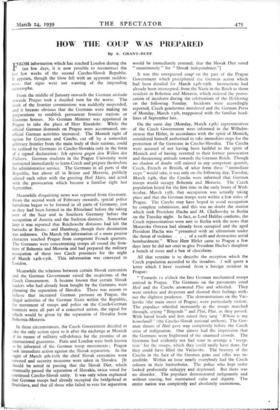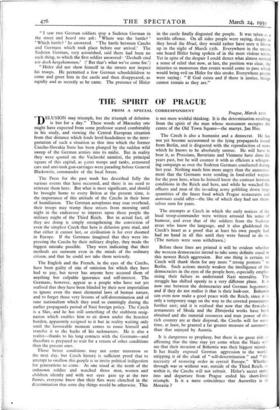HOW THE COUP WAS PREPARED
By S. GRANT-DUFF
FROM information which has reached London during the last few days, it is now possible to reconstruct the last few weeks of the second Czecho-Slovak Republic. It appears, though the blow fell with an apparent sudden- ness, that signs were not wanting of the impending catastrophe.
From the middle of January onwards the German attitude towards Prague took a decided turn for the worse. The work of the frontier commissions was suddenly suspended, and it became obvious that the Germans were making no preparations co establish permanent frontier stations or Customs houses. No German Minister was appointed in Prague to take the place of Herr Eisenlohr. While the official German demands on Prague were accentuated, un- official German activities increased. The Munich right of option for Germans and Czechs, cut off by a somewhat arbitrary frontier from the main body of their nations, could be realised by Germans in Czecho-Slovakia only in the form of a signed declaration: Ich optiere gegen den Willen des Fiihrers. German students in the Prague University were instructed immediately to learn Czech and prepare themselves for administrative service. The Germans in all parts of the Republic, but above all in Briton and Moravia, publicly saluted each other with the greeting Heil Marz, and acted with the provocation which became a familiar sight last September.
Meanwhile disquieting news was reported from Germany. From the second week of February onwards, special police battalions began to be formed in all parts of Germany, just as they had been formed in the Rhineland before the taking over of the Saar and in Southern Germany before the occupation of Austria and the Sudeten districts. Somewhat later it was reported that Reichswehr divisions had left the barracks at Bremen and Hamburg, though their destination was unknown. On March 7th information of a more precise character reached Prague from competent French quarters. The Germans were concentrating troops all round the fron- tiers of Bohemia and Moravia and had prepared the military occupation of these two Czech provinces for the night of March LIth-r5th. This information was conveyed to London.
Meanwhile the relations between certain Slovak extremists and the German Government raised the suspicions of the Czech Government. It became known that certain Slovak leaders who had already been bought by the Germans were planning the separation of Slovakia. There was reason to believe that increased German pressure on Prague, the illegal activities of the German Nazis within the Republic, the movement of troops and police on the Czech-German frontiers were all part of a concerted action, the signal for which would be given by the separation of Slovakia from Bohemia-Moravia.
In these circumstances, the Czech Government decided to take the only action open to it after the exchange at Munich of its means of military self-defence for the promise of an international guarantee. Paris and London were both known to be informed of the German troop movements ; Prague took immediate action against the Slovak separatists. In the night of March 9th-loth the chief Slovak extremists were arrested and security measures were taken in Slovakia. [It should be noted in passing that the Slovak Diet, which eventually passed the separation of Slovakia, twice voted for continued Czecho-Slovak unity. It was only when explained that German troops had already occupied the bridgehead at Bratislava, and that all those who failed to vote for separation would be immediately arrested, that the Slovak Diet voted " unanimously " for "Slovak independence."] It was this unexpected coup* on the part of the Prague Government which precipitated the German action which had been detailed for March t4th-t 5th. Instructions had already been intercepted, from the Nazis in the Reich to those resident in Bohemia and Moravia, which ordered the provo- cation of incidents during the celebrations of the Heldentag on the following Sunday. Incidents were accordingly reported, Czech gendarmes murdered and the German Press of Monday, March 13th, reappeared with the familiar head- lines of September last..
On the same day (Monday, March 13th) representatives of the Czech Government were informed in the Wilhelm- strasse that Hitler, in accordance with the spirit of Munich, considered himself authorised to take immediate steps for the protection of the Germans in Czecho-Slovakia. The Czechs were accused of not having been faithful to the spirit of Munich and of having reverted to their former provocative and threatening attitude towards the German Reich. Though no shadow of doubt still existed in any competent quarter, Czech, French or British, of what form these "immediate steps "would take, it was only on the following day, Tuesday, March 14th, that the Czechs were informed that German troops would occupy Bohemia and Moravia. The Czech population heard for the first time in the early hours of Wed- nesday, March i5th, that occupation was actually taking place and that the German troops were within a few miles of Prague. The Czechs may have hoped to avoid occupation by complete submission, and this was no doubt the motive which took President Haas and M. Chalkovsky to Berlin on the Tuesday night. In fact, as Lord Halifax confirms, the Czech representatives were met in Berlin with the news that Moravska Ostrava had already been occupied and the aged President Hacha was "presented with an ultimatum under the threat of violence . . . of a swift and destructive aerial bombardment." When Herr Hitler carne to Prague a few days later he did not omit to give President Hacha's daughter a bunch of roses and a box of chocolates.
All that remains is to describe the reception which the Czech population accorded to the invaders. I will quote a letter which I have received from a foreign resident in Prague: "Towards x i o'clock the first German mechanised troops arrived in Prague. The Germans on the pavements cried Heil and the Czechs answered Pfui and whistled. They were stricken and desperate and showed their feelings with- out the slightest prudence. The demonstrations on the Vac- lavske (the main street of Prague) were particularly violent. The populace whistled incessantly as the troops marched through, crying " Brigands " and Pfui, Pfui, as they passed. With bared heads and fists raised they sang 'Where is my homeland?' (the Czecho-Slovak national anthem). The Ger- man shouts of Heil gave way completely before the Czech cries of indignation. One almost had the impression that the Germans were frightened of the unarmed crowds. The Germans had evidently not had time to arrange a ' recep- tion ' for the troops, which they could easily have done, for they could have filled the Vaclavske. The bravery of the Czechs in the face of the German guns and rifles was in- credible. Within an hour nearly everybody had the Czech colours in their buttonholes. The police who kept order looked profoundly unhappy and depressed. But there was no disorder. The populace demonstrated indignantly and without ceasing, but maintained calm and dignity. The entire nation was completely and absolutely unanimous. "I saw two German soldiers stop a Sudeten German in the street and heard one ask: Where was the battle?' 'Which battle? ' he answered. 'The battle between Czechs and Germans which took place before our arrival.' The Sudeten German, very astonished, said there had been no such thing, to which the first soldier answered: `Deshalb sind wir doch hergekommen.' (` But that's what we've come for.') "Hitler did not show himself in the streets nor inspect his troops. He permitted a few German schoolchildren to come and greet him in the castle and then disappeared, as rapidly and as secretly as he came. The presence of Hitler in the castle finally disgusted the people. It was taken as a terrible offence. On all sides people were saying, deeply as they loved the Hrad, they would rather have seen it blown up in the night of March r5th. Everywhere in the streets one heard Hitler being spoken of in the most violent terms. Yet in spite of the despair I could detect what almost seemed a sense of relief that now, at last, the position was clear, the injustice so monstrous that events would come to pass which would bring evil on Hitler for this stroke. Everywhere people were saying: "If God exists and if there is justice, things cannot remain as they are."















































 Previous page
Previous page